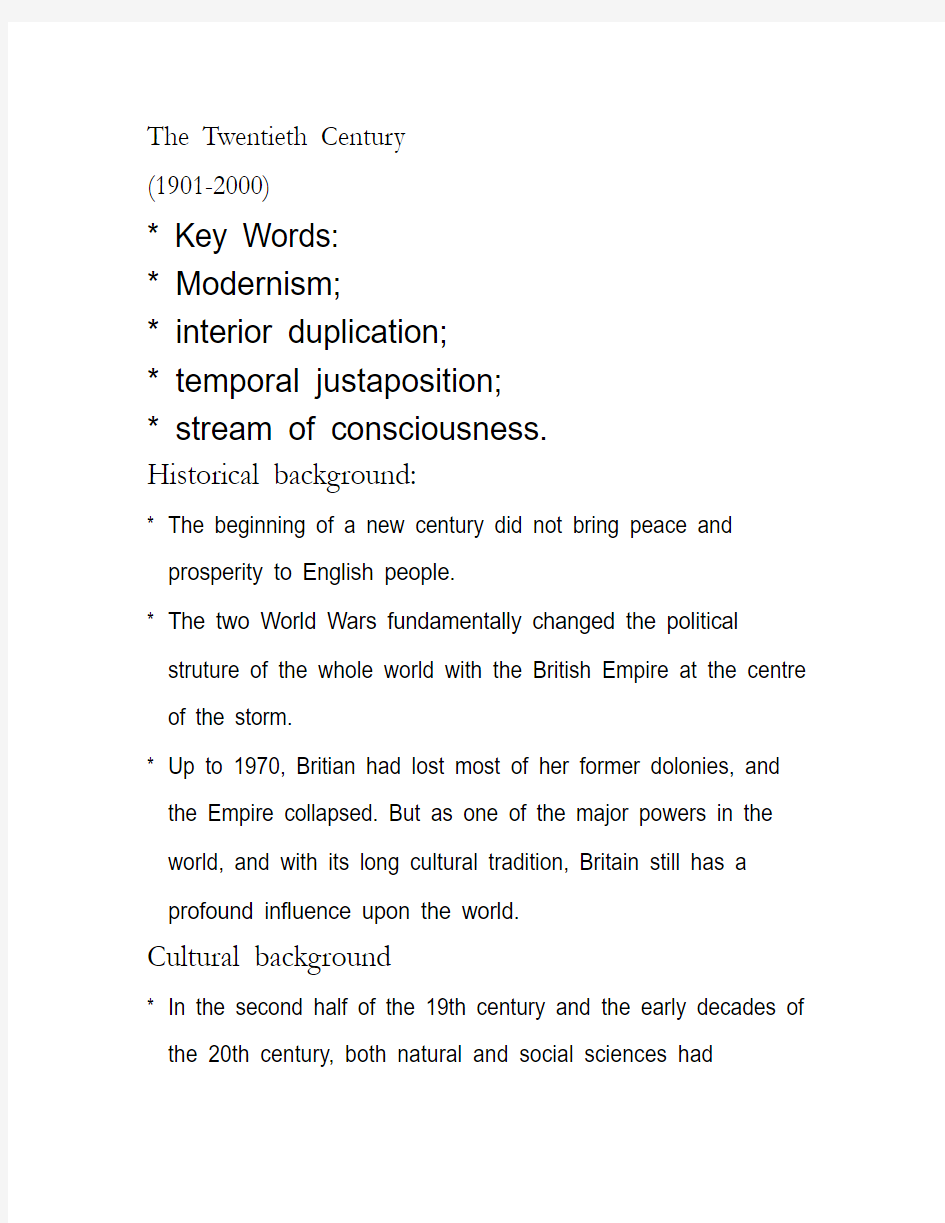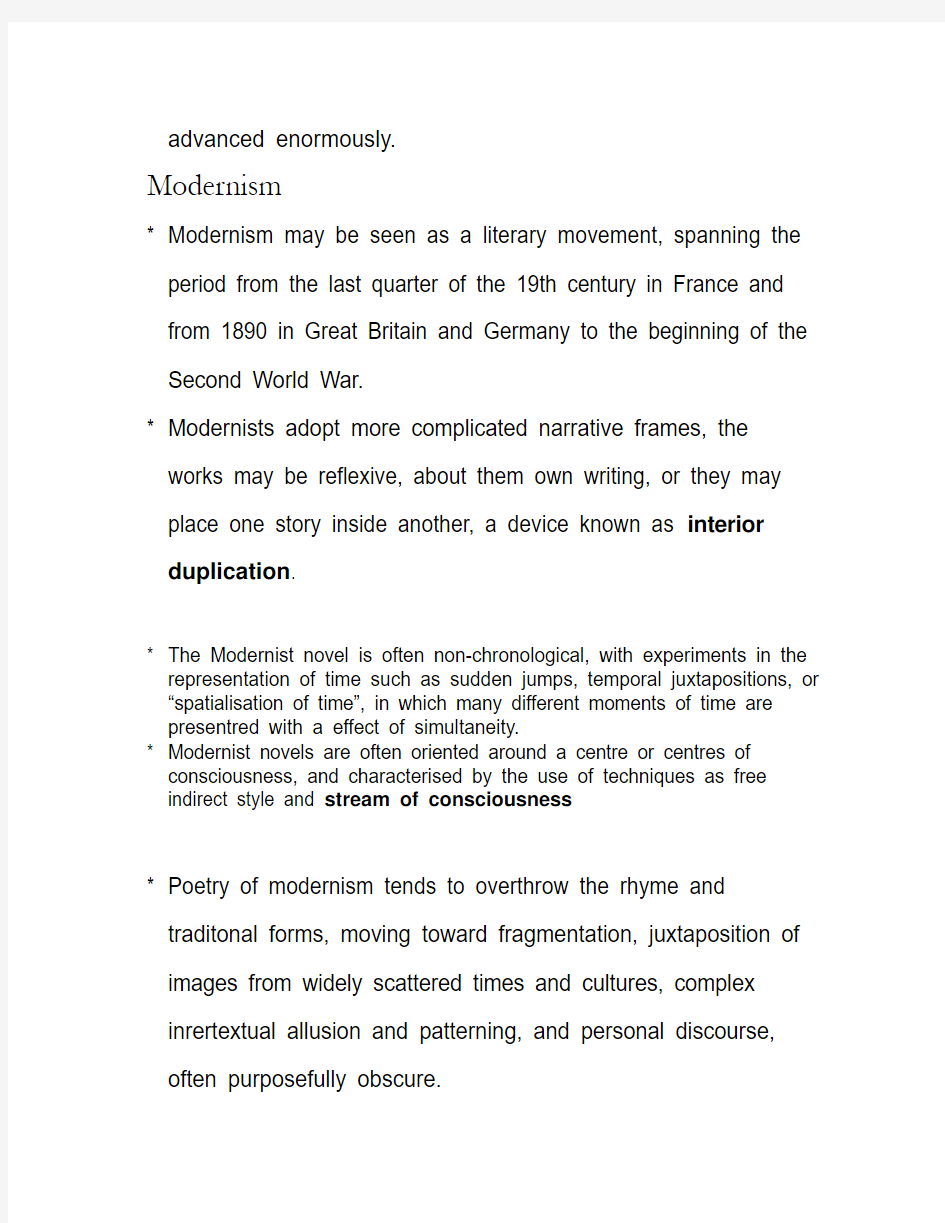The Twentieth Century


The Twentieth Century
(1901-2000)
* Key Words:
* Modernism;
* interior duplication;
* temporal justaposition;
* stream of consciousness.
Historical background:
* The beginning of a new century did not bring peace and prosperity to English people.
* The two World Wars fundamentally changed the political struture of the whole world with the British Empire at the centre of the storm.
* Up to 1970, Britian had lost most of her former dolonies, and the Empire collapsed. But as one of the major powers in the world, and with its long cultural tradition, Britain still has a profound influence upon the world.
Cultural background
* In the second half of the 19th century and the early decades of the 20th century, both natural and social sciences had
advanced enormously.
Modernism
* Modernism may be seen as a literary movement, spanning the period from the last quarter of the 19th century in France and from 1890 in Great Britain and Germany to the beginning of the Second World War.
* Modernists adopt more complicated narrative frames, the works may be reflexive, about them own writing, or they may place one story inside another, a device known as interior duplication.
* The Modernist novel is often non-chronological, with experiments in the representation of time such as sudden jumps, temporal juxtapositions, or “spatialisation of time”, in which many different moments of time are presentred with a effect of simultaneity.
* Modernist novels are often oriented around a centre or centres of consciousness, and characterised by the use of techniques as free indirect style and stream of consciousness.
* Poetry of modernism tends to overthrow the rhyme and traditonal forms, moving toward fragmentation, juxtaposition of images from widely scattered times and cultures, complex inrertextual allusion and patterning, and personal discourse, often purposefully obscure.
William ButlerYeats ( 1865-1939)
* Yeats lived during a tumultuous time in Ireland.
* His themes, images, symbols, metaphors, and poetic sensibilities encompass the breadth of his personal experience as well as his nation’s experience during the troubled time.
The Lake Isle of Innisfree
因纳斯弗里岛
The Lake Isle of Innisfree
* I will arise and go now, and go to Innisfree,
And a small cabin build there, of clay and wattles made:
Nine bean-rows will I have there, a hive for the honey-bee,
And live alone in the bee-loud glade.
And I shall have some peace there, for peace comes dropping slow,
Dropping from the veils of the mourning to where the cricket sings;
There midnight's all a glimmer, and noon a purple glow,
And evening full of the linnet's wings.
I will arise and go now, for always night and day
I hear lake water lapping with low sounds by the shore;
While I stand on the roadway, or on the pavements grey,
I hear it in the deep heart's core.
因纳斯弗里岛
* 现在,我要起身走了,
去因纳斯弗里。
建一所小棚屋在那里,用黏土和藤条筑成。
我将在那儿栽九行豆角,还有一个为蜜蜂而备的蜂巢。
我将独自居住在风声喧杂的林中空地。
* 在那儿,我该会有一些宁静,
因为宁静在缓慢的低落中来临,
低落从清晨的幕幛,到蟋蟀吟唱的所在。
那里夜半一片闪烁,午间紫色炫亮,傍晚充盈着红雀的羽翼。
* 现在,我要起身走了。
因为,日夜不息的,
我总是听到湖水低沉的拍打,沿着岸边的声息。
而那时,我正站在行车路面,或灰色的人行道上。
我听见了它,在我内心深深的河里。
* The poem is a simple imagery of the quiet life the poet longs to lead, until the penultimate line jolts him back into the reality of his drab urban existence: “ Whille I stand on the roadway, or on the pavements grey.”
Yeat’s poetry: aristic features and thematic focus
* Yeats is generally considered to be one of the 20th century’s key English language poets. Yet, unlike most Modernists who experimented with free verse, Yeats was a master of the traditional verse forms.
* Yeat’s great poetic project was to reify his own life-his thoughts, feelings, speculations, conclusions, dreams-into poetry: to render all of himself into art, but not in a merely confessional or autobiographical mann er; he
was not interested in the common-place.
No Second Troy
* Why should I blame her that she filled my days
* With misery, or that she would of late
* Have taught to ignorant men most violent ways,
* Or hurled the little streets against the great,
* Had they but courage equal to desire?
* What could have made her peaceful with a mind
* That nobleness made simple as a fire,
* With beauty like a tightened bow, a kind
* That is not natural in an age like this,
* Being high and solitary and most stern?
* Why, what could she have done, being what she is?
* Was there another Troy for her to burn?
这个为最后一次作业!
要求大家把作业提交到网上,也就是我空间的第一篇日志里!
具体内容和要求见日志!
截止日期为12月29日晚22点。
* 诗人年轻时爱上了一位爱尔兰美女,可是她却以爱尔兰从英国治下获取独立为自己的终身奋斗目标,甚至不惜通过暴力。情怀高尚可又简单盲目,美人成了拉满的弓箭。面对无谓之举及无望之爱,诗人痛苦万分。木马计巧破特洛伊城侥幸成功的传说故事被诗人用作反衬:历史不可能重演。
特洛伊难再倾覆
* 我为何要将她责备?
* 因为她让我的生活充满痛苦。
* 她近来竟要以弱抗强,
* 鼓动无知的勇夫走上血战之路。* 他们哪有与你相比的勇气?
* 他们岂能生死不渝?
* 平和的心怎么燃起烈火?
* 高尚的情怀为何变得简单盲目? * 美人成了拉满的弓箭,
* 这真是时代的谬误。
* 为何要如此心高气傲?
* 为何要这般冷酷孤独?
* 身为一个美丽的少女,
* 这种奋斗能有何结局?
* 历史的故事不会重演,
* 特洛伊难再倾覆。
